| Srl | Item |
| 1 |
ID:
144463
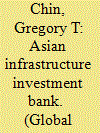

|
|
|
| 2 |
ID:
144465
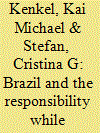

|
|
|
|
|
| Summary/Abstract |
This article examines Brazil's responsibility while protecting (RwP) initiative as an example of norm sponsorship available to nonpermanent members of the Security Council. After setting the stage with Brazil's historical engagement with intervention issues, it discusses the reasons behind the Brazilian initiative. It examines RwP's key proposals and the reactions they generated. RwP's normative implications are discussed, together with an examination of the main reasons why Brazil's sponsorship of the initiative waned following its exit from the Council. Brazil's withdrawal from sponsoring RwP highlights the need for ongoing support for initiatives that seek to revive the international community's intervention practices by tackling the basic tenets of discord over R2P's implementation.
|
|
|
|
|
|
|
|
|
|
|
|
|
|
|
|
| 3 |
ID:
144466
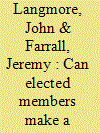

|
|
|
|
|
| Summary/Abstract |
The UN Charter gives the Security Council the extraordinary function of being responsible for international peace and security. Although the Permanent Five members are disproportionately powerful, there is nevertheless scope for elected members to influence the Council's decisionmaking processes during their short two-year terms. This article uses Australia's membership in 2013 and 2014 as a case study to examine why states seek election to the Council, means through which they can strengthen their influence, how they can navigate P5 power, how successful they are in achieving their objectives, and how the effectiveness of both elected members and the Council as a whole could be improved. Despite the substantial constraints facing elected members, those that are imaginative and industrious can nevertheless make influential contributions to achievement of the Council's purposes.
|
|
|
|
|
|
|
|
|
|
|
|
|
|
|
|
| 4 |
ID:
144469
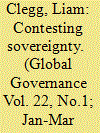

|
|
|
|
|
| Summary/Abstract |
There is a battle over military expenditure at the International Monetary Fund, with consistent pressure from its most powerful member for the Fund to get tough on military expenditure being pitted against lowerorder states' invocation of the organization's sovereignty-protecting rules and practices. While the formal victory of the lower-order states has been codified in the Fund's relatively weak Guidelines on Military Expenditure, on a case-by-case basis policy shifts continue to be imposed on borrowers through the application of informal influence by the US Executive Director in the IMF boardroom. By integrating insights from literature exploring the tension between formal rules and informal practices in international organizations, this case study extends the understanding offered in the international relations literature of the foundations of sovereign inequality in international politics.
|
|
|
|
|
|
|
|
|
|
|
|
|
|
|
|
| 5 |
ID:
144462


|
|
|
| 6 |
ID:
144464


|
|
|
| 7 |
ID:
144470
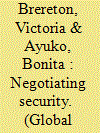

|
|
|
|
|
| Summary/Abstract |
This article examines the negotiation of security in landmark peace agreements brokered in Sudan (2002−2005) and Kenya (2008). It reviews the dominant literature on peace agreements, arguing that preoccupation with agreements' durability has led to the neglect of questions about whether and under what conditions agreements work to improve human security. The article calls for a different approach to analysis of peace agreements' quality that addresses how transformative they are of security conditions for ordinary people. Applying this lens to the Sudanese and Kenyan accords, it outlines the agreements' commitments to improved human security and the range of factors that shaped and undermined prospects for the realization of those commitments in practice, even prior to implementation. It concludes with lessons for international conflict resolution practitioners.
|
|
|
|
|
|
|
|
|
|
|
|
|
|
|
|
| 8 |
ID:
144467
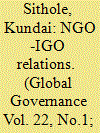

|
|
|
|
|
| Summary/Abstract |
This article draws on the previously unseen archival record to examine Amnesty International's contribution to the abolition of the death penalty in the Council of Europe legal space. The Parliamentary Assembly and the European Court of Human Rights' contributions are widely discussed in scholarly and policy circles alike, but Amnesty International's substantive contribution in the 1970s and in 1989 is less well documented. Political and legal actors in Strasbourg have significant control over the content and timing of international agreements, but in this case Amnesty International was decisive in shifting substantive considerations as to need for regional intervention to prohibit European states from exposing individuals to the death penalty. Of interest to policy students and international relations scholars alike, documenting Amnesty International activity also provides an illustration of nongovernmental actors' contribution to Strasbourg human rights policymaking over time and across a range of political and judicial actors.
|
|
|
|
|
|
|
|
|
|
|
|
|
|
|
|
| 9 |
ID:
144471


|
|
|
|
|
| Summary/Abstract |
Palestine's request that the International Criminal Court investigate crimes allegedly committed by Israel on its territory presents the court with a major investigative and institutional challenge. To this point, the ICC has generally avoided situations where major powers strongly oppose court involvement. The prosecution's cautious selection of situations has in turn allowed for an accommodation between skeptical major powers and the court. An investigation in Palestine, which the United States and other major powers would oppose, could unsettle that fragile truce. This article considers how the situation in Palestine came before the court and analyzes several options available to the ICC prosecutor.
|
|
|
|
|
|
|
|
|
|
|
|
|
|
|
|
| 10 |
ID:
144468
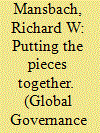

|
|
|
|
|
| Summary/Abstract |
This article examines the role of global financial institutions, the World Bank, and the International Monetary Fund, as well as the Group of 20 and the main European financial institution, the European Central Bank, in the aftermath of the 2008 financial crisis. The central question is whether these institutions are helping or hindering Europe's recovery. Looking at the activities of these institutions from 2008 to 2014, the article concludes that they have had little impact on the recovery itself. Instead, their focus has been on preventing further damage and eliminating the possibility of such a crisis in the future.
|
|
|
|
|
|
|
|
|
|
|
|
|
|
|
|